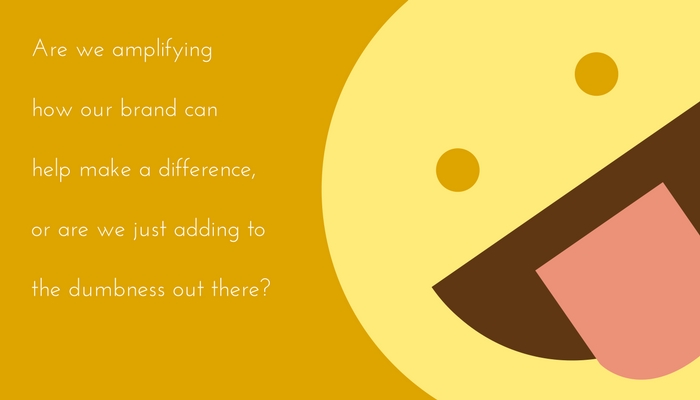Are we making our prospects dumber? (And what purpose can do to help)
Your phone buzzes. It's a text. You stop what you're doing to answer it. You finish and it buzzes again. It's an update from a news site you follow. Then your laptop dings. A Slack message from a teammate. Then a notification of an email in your inbox. Then your phone buzzes again.
Wait. There's more. I haven't even mentioned the updates and notifications from Twitter, Facebook, LinkedIn, Instagram, Snapchat, Pinterest, and…well, you get the picture.
According to the Harvard Business Review, "…a study commissioned by Hewlett-Packard reported that the IQ scores of knowledge workers distracted by e-mail and phone calls fell from their normal level by an average of 10 points..."
Dominated by distractions
We live in a world dominated by distractions. A phenomenon that has increased rapidly with the rise of the digital world. The things that call for our attention on a daily basis have expanded exponentially in my lifetime. I'm going to sound like an old-timer, but when I was a kid, video games weren't a thing (okay, Pong did appear on our TV sets while I was in my teens.) A social network was that group of kids from the neighborhood that hung out on the corner. And we had three channels on our TV (and my mom still yelled at us to turn it off and go outside to play.) Looking back, there was no way we could have predicted the massive assault on our attention that we accept as normal today.
Are we contributing to the dumbing down of everyone?
Everyone can agree that the change has been monumental over the last three decades. It is tough for a brand to stand out among the tidal wave of information pushed at our prospects every day. So brands do what they have always done when the fight for attention becomes particularly challenging. They turn up the volume.
When I watch local TV, I'm reminded that this isn't a new phenomenon. The commercial break is filled with car dealers. Yelling at me over an onslaught of blinking price starbursts and waving American flags.
Why do we think that just getting louder and gaudier is the answer to winning over prospects?
Yet an insane number of brands still default to this pre-digital age way of addressing people, defaulting to attention-getting stunts. We still see an inordinate amount of tactics based on the thought that if I can just distract you for a second, then I can get you to notice me.
That is terribly inadequate. But what may be worse is the assumption of many brands that the ability to distract you equates to the ability to make you care.
You're probably nodding along. Saying, "Yeah, those car dealer commercials suck." But do we really get a hall pass? We ought to take a good hard look at everything that our brand is doing. Are we pushing emails out because we just need to stay in front of prospects? Or are we really offering them something helpful? Are we invading their social feeds? Or do we make it feel like we've dropped by with something that might be of use to them? Does our brand feel ravenous for their attention or empathetic and generous?
Our prospects don't need more distractions in their lives.
The purpose antidote
We need our prospects' attention in order for a relationship to begin. The trouble is that too many brands stop there. Attention is the first step. But attention is fleeting. I can get your attention by punching you in the face. It's a pretty safe bet that we're not going to have much of a relationship after that.
Attention needs to be attached to something meaningful for the prospect. No, that's not your latest feature or your blinking price starburst. Features and prices are things that our prospects will consider, but it is not what they desire. This is why attention needs to be attached to a reason to care. This is why a brand needs purpose.
A purpose orients a brand to how it will make a difference in lives. That is something that becomes incredibly appealing to prospects. We can build attention-getting, memorable, and lasting engagements by helping them see how they can be part of this meaning that we are bringing to the world.
This genuine appeal and relevance to our prospects get us out of the game of invading their world and shouting louder. Most of all, it helps our brand build richer relationships with our prospects.
Maybe the touchstone for our efforts should be a question, "Are we amplifying how our brand can help make a difference, or are we just adding to the dumbness out there?"
Dan Salva is a co-founder of Will & Grail, with more than three decades of experience in brand marketing and developing and implementing go-to-market strategies. He can be reached at dsalva@willgrail.com.

